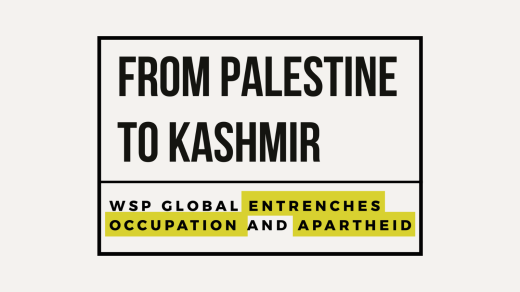
In this new report, Just Peace Advocates, Al-Haq, and Kashmir Law & Justice Project further expose the role WSP Global, a Canadian multi-national company, plays in entrenching occupation and apartheid in Palestine and Kashmir.
WSP Global is a major participant in Israel’s settler colonial apartheid regime and unlawful occupation in Palestine. It is the project manager for the Jerusalem Light Rail (JLR) and supported the Tel-Aviv Jerusalem Fast Train (A1) project located in unlawfully annexed and occupied Jerusalem. They are also significantly involved in the ongoing occupation of Kashmir, through their construction of the Chenab railway bridge. Just Peace Advocates and Al-Haq have made two submissions to the UN, requesting they be added to the UN Database of businesses operating in illegal Israeli settlements. Unfortunately, to date, WSP has evaded this, and all other consequences. Despite having an office in most major Canadian cities, WSP has not gotten the attention it deserves—for aiding Israel’s discriminatory apartheid practices, unlawful occupation and furthering illegal annexation.
WSP is a Canadian, Quebec-based, company that provides technical expertise and strategic advice regarding construction and infrastructure. WSP has offices in over 51 countries globally, with 111 locations and 12,600 employees in Canada alone. Notably, both the Canada Pension Plan Investment Board (CPPIB)—Canada’s national pension plan—and la Caisse de dépôt et placement du Québec (CDPQ)—which manages Quebec’s pension plan—are the largest WSP shareholders, with 8.9% and 13.89% respectively. This means all individuals contributing to the Canada Pension Plan (CPP) or the Quebec Pension Plan (QPP) are actively contributing to WSP’s violations of international law.
WSP was first involved with the A1 train in 2014, when it finalized the acquisition of Parsons Brinckerhoff who provided technical advisory services for the A1. Then, in 2016, the WSP-Parson Brinkerhoff team was contracted to complete the electrification of the A1, a NIS 12 billion project that included 420km of track, 13 passenger lines, and the construction of 14 railway stations. In 2018, WSP not only performed measurements and participated in a test drive of the measurements wagon, they also agreed to provide contractor coordination and project management services for 10 years.
The Jerusalem Light Rail is a massive Israeli railway project that connects various illegal settlement blocks in occupied East Jerusalem to other areas of the city to “creat[e] territorial continuity and eas[e] settler movement.” It consists of three main lines, as well as various expansion projects. As project manager, WSP is responsible for monitoring the progress and quality of construction of the J-Net project—the expansion of the Red Line and Green Line development. Datumate, a construction technology company whose software WSP is using for the JLR, describes WSP as “an integral part of the operation, with a wide role that includes reviewing the designs, monitoring quality and progress on behalf of the State, and ensuring the project is completed to specification.”
WSP is actively participating in both of the Israeli and Indian occupations. They are enthusiastically aiding and abetting the expansion of these settler-colonial projects through war crimes. While WSP has wiped its site of any references to the JLR, it openly brags about its work in occupied Kashmir. This suggests that perhaps WSP knows what it is doing in Palestine is wrong—and it must know that its actions in Kashmir are no different. As a Canadian, multinational company, WSP must be held accountable for their participation in settler colonial, occupation projects – from Palestine to Kashmir.
Activities in Occupied Kashmir and Jammu Chenab Railway Bridge
Chenab bridge was conceived in the 1970s/1980s as part of 326km railway system planned to connect Jammu and Kashmir with India. While it was formally organized in the late 20th century, it had first been considered in 1898, but put on hold because of the complex nature of the terrain. In 2003, the Ministry of Indian Railways launched the Jammu–Udhampur-Srinagar-Baramulla Rail Line (JUSBRL) project. The Chenab bridge is part of the JUSBRL and connects Udhampur with the Kashmir Valley. WSP boasts that it “designed the world’s highest and longest steel arch bridge for railway traffic in India.” They clearly recognize the bridge is located in Kashmir on their website, and flaunt their work saying, “[t]he end result is a convincing demonstration of WSP’s world-class steel bridge design expertise.”
Please find full report here.

